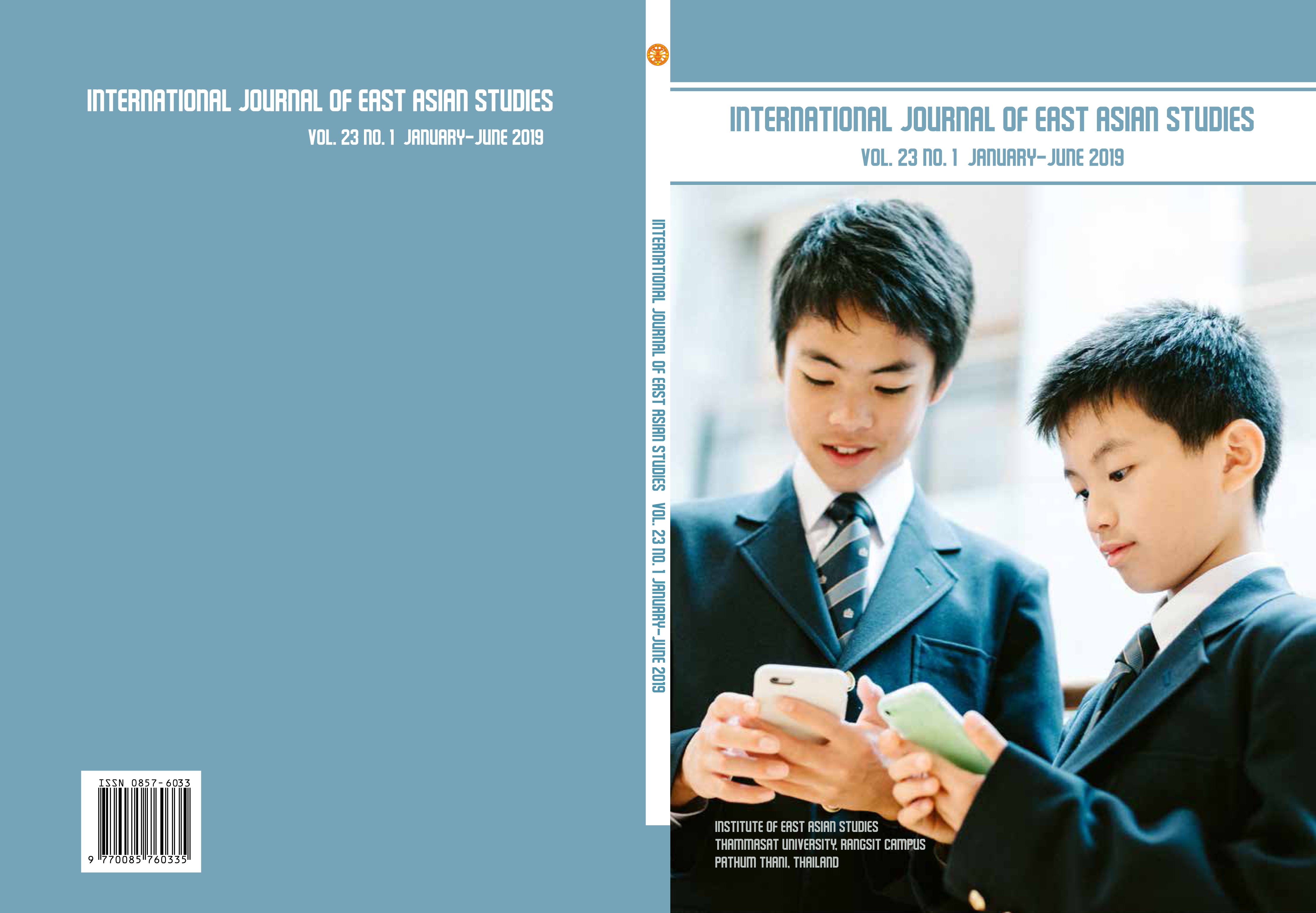The Role of Korean Civil Societies on the Japanese Comfort Women Issue: The Erecting of Comfort Women Statue Abroad
Keywords:
comfort women, Korean civil societies, human rights, women’s rights, transnational advocacy networkAbstract
The aim of this article is to study the role of South Korean civil societies in erecting Korean comfort women statues abroad after the reaching of comfort women agreement on December 28, 2015 between South Korean and Japanese government. The study demonstrates the manner in which the statues were able to be established in different countries, outside South Korea, by investigating 3 groups of South Korean civil societies - the Korean council for women drafted for military sexual slavery by Japan (the Korean Council), Hwaseong city civic group, and Suwon city civic group - that have central role in moving the issue toward international arena to calling for responsibility and sincere apology from Japanese government. This article founds that the erecting Korean comfort women statues abroad was done by South Korean civil societies making transnational network with group of civil society in other country - especially the country that colonized by Japan before and between World War II - and international organizations. In making cooperation with transnational network, South Korean civil societies do it under sisterhood concept and universal ideology – human rights and women’s rights - that have very significant ideology today.
References
Board of Supervisors. (2015, September 22). Resolution urging the City and County of San Francisco to establish a memorial for "Comfort Women" and to educate the community about stopping global human trafficking of women and girls. Retrieved from https://sfbos.org/ftp/uploadedfiles/bdsupvrs/resolutions15/r0342-15.pdf
Hankyoreh. (2016, December 11). Comfort woman statue in Washington DC seeking a permanent home. Retrieved 2018, May 2, from https://www.hani.co.kr/arti/english_edition/e
international/774140.html
Herbermann, N. (2000). The Blessed Abyss: Inmate #6582 in Ravensbrück Concentration Camp for Women, trans. Hester Baer. Michigan: Wayne State University Press.
Hooks, B. (2015). Feminist theory: From margin to center. New York: Routhledge.
Hwang, E. (2016). Politics of statue: Peace monument and the personification of memory. EPIK Journals Online 7(1): Retrieved April 25, 2018, from https://www.eai.or.kr/main/search_view.asp?intSeq=6867&board=kor_report
Japan Times. (2016, September 8). Europe’s first ‘comfort women’ statue planned for German city. Retrieved from https://www.japantimes.co.jp/news/2016/09/08/national/plan-afoot-install-europes-first-comfort-women-statuefreiburg/#.Wyv5KaczbIU
Muta, K. (2016). The ‘Comfort Women’ issue and the embedded culture of sexual violence in contemporary Japan. Current Sociology Monograph 64(4), 620- 636.
Keck, M. E., & Sikkink, K. (1998). Activist beyond Borders: Advocacy Networks in International Politics. United States of America: Cornell University Press.
Kern, T., & Nam, S. (2009). The Korean Comfort Women Movement and the Formation of a Public Sphere in East Asia. in F. Rüdiger, J.E. Hoare, P. Köllner, & S. Pares (Eds.), Korea Yearbook 2009: Politics, Economy and Society (pp. 227-255). Leiden: Brill.
Kumagai, N. (2016). The Comfort Women: Historical, Political, and Moral Perspectives. (David Noble, Trans.). Tokyo: International House of Japan.
Reuters. (2018, August 14). South Korea marks first ‘comfort women’ day, jointed by protestors in Taiwan. Retrieved from https://www.reuters.com/article/us-asia-comfortwomen/south-korea-marks-first-comfort-women-day-joined-by-protestors-in-taiwan-idUSKBN1KZ07O
Rienzi, G. (2015). Other nations could learn from Germany’s effort to reconcile after WWII. Johns Hopkins University (summer). Retrieved May 30, 2018, from https://hub.jhu.edu/magazine/2015/summer/germany-japan-reconciliation/
Shanghaiist. (2015, December 5). First Chinese memorial commemorating the suffering of ‘comfort women’ opens in Nanjing. Retrieved from https://shanghaiist.com/2015/12/02/comfort_women_memorial_opensin_nanjing/
Son, E. W. (2018). Embodied reckoning: “comfort women,” performance, and transpacific regress. Ann Arbor: University of Michigan.
South China Morning Post. (2016). Learn from the past to build a better world, ‘comfort women’ historian urges young Chinese. Retrieved from https://www.scmp.com/news/china/diplomacy-defence/article/2039979/look-past-build-better-world-comfort-women-historia
Stetz, M. D., & Oh, Bonnie B. C. (2015). Legacies of the Comfort Women of World War II. New York: Routledge.
The Asahi Shimbun. (2017, November 24). Osaka to cut ties to San Francisco over ‘comfort women’ statue. Retrieved from https://www.asahi.com/ajw/articles/AJ201711240033.html
The DC Mayor’s Office on Asian and Pacific Islander Affairs (MOAPIA). (2007). Government Resources. Retrieved from https://apia.dc.gov/page/government-resources
The Dong-A Ilbo. (2016, October 24). Comfort women statues set up for the first time in China. Retrieved from https://english.donga.com/3/all/26/766669/1
The Korea herald. (2014, August 24). In solidarity with wartime rape victims. Retrieved from https://www.koreaherald.com/view.php?ud=20140824000084
The Korea Times. (2017, March 15). Japan seeks to remove first 'Girl Statue' in Europe. Retrieved July 1, 2018, from https://www.koreatimes.co.kr/www/nation/2017/03/12_ 225735.html
The Washington post. (2018, January 22). Japan’s prime minister could solve the ‘comfort women’ issue once and for all. So why won’t he?. Retrieved from https://www.washingtonpost.com/news/democracy-post/wp/2018/01/22/japans-prime-minister-could-solve-the-comfort-women-issue-once-and-for-all-so-why wonthe/?utm_term=.34f0bb0e8dd9
Tsutsui, K. (2006). Redressing past Human Rights Violations: Global Dimensions of Contemporary Social Movements. Social Forces. 85 (1), 331-354.
United Nations, (2014). Women’s rights are human rights, New York and Geneva: UnitedNations.
Winanti, P. S., & Hanif, H. (2014). Transnational Advocacy for Advocating Governance Reform in Extractive Industries in ASEAN: Make Transparency Works. Paper presented at International Conference on ASEAN Studies 2014 (ICONAS): Yogyakarta. (Mimeographed)
Yonhap News Agency. (2017, March 9). Statue remembering Korea's comfort women erected in Germany. Retrieved from https://english.yonhapnews.co.kr/national/2017/03/09/0302000000AEN20170309000251315.html


